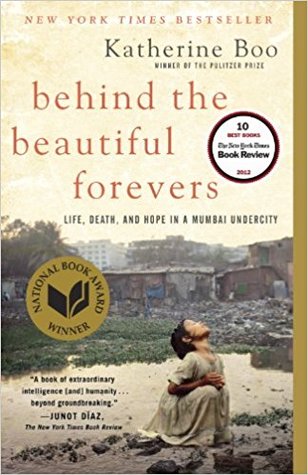More on this book
Community
Kindle Notes & Highlights
Read between
February 19 - February 22, 2020
“Everything around us is roses” is how Abdul’s younger brother, Mirchi, put it. “And we’re the shit in between.”
To be poor in Annawadi, or in any Mumbai slum, was to be guilty of one thing or another.
It seemed to him that in Annawadi, fortunes derived not just from what people did, or how well they did it, but from the accidents and catastrophes they dodged. A decent life was the train that hadn’t hit you, the slumlord you hadn’t offended, the malaria you hadn’t caught.
As group identities based on caste, ethnicity, and religion gradually attenuated, anger and hope were being privatized, like so much else in Mumbai.
For every two people in Annawadi inching up, there was one in a catastrophic plunge.
She was a chit in a national game of make-believe, in which many of India’s old problems—poverty, disease, illiteracy, child labor—were being aggressively addressed. Meanwhile the other old problems, corruption and exploitation of the weak by the less weak, continued with minimal interference.
In the West, and among some in the Indian elite, this word, corruption, had purely negative connotations; it was seen as blocking India’s modern, global ambitions. But for the poor of a country where corruption thieved a great deal of opportunity, corruption was one of the genuine opportunities that remained.
The Indian criminal justice system was a market like garbage, Abdul now understood. Innocence and guilt could be bought and sold like a kilo of polyurethane bags.
Being terrorized by living people seemed to have diminished his fear of the dead.
He thought it better to start the day by acknowledging that it was going to be just as dull as the days preceding it. That way, you wouldn’t be disappointed.
But since Fatima burned, he’d been estranged from all known landmarks. Being dirty was the remnant of a former existence he had to cling to.
In Delhi, politicians and intellectuals privately bemoaned the “irrationality” of the uneducated Indian masses, but when the government itself provided false answers to its citizens’ urgent concerns, rumor and conspiracy took wing. Sometimes, the conspiracies became a consolation for loss.
But something he’d come to realize on the roof, leaning out, thinking about what would happen if he leaned too far, was that a boy’s life could still matter to himself.
Every country has its myths, and one that successful Indians liked to indulge was a romance of instability and adaptation—the idea that their country’s rapid rise derived in part from the chaotic unpredictability of daily life. In America and Europe, it was said, people know what is going to happen when they turn on the water tap or flick the light switch. In India, a land of few safe assumptions, chronic uncertainty was said to have helped produce a nation of quick-witted, creative problem-solvers.
Instead of admitting that she was making little progress, she had invented new definitions of success.
The forces of justice had finally come to Annawadi. That the beneficiaries were horses was a source of bemusement to Sunil and the road boys.
powerless individuals blamed other powerless individuals for what they lacked. Sometimes they tried to destroy one another. Sometimes, like Fatima, they destroyed themselves in the process.
In the age of global market capitalism, hopes and grievances were narrowly conceived, which blunted a sense of common predicament.
If there was no mastering this vast, winking city, he could still master a few feet of gummy road.
What is the infrastructure of opportunity in this society? Whose capabilities are given wing by the market and a government’s economic and social policy? Whose capabilities are squandered? By what means might that ribby child grow up to be less poor?
(The scholars who map levels of disparity between wealthy and impoverished citizens consider New York and Washington, D.C., almost as unequal as Nairobi and Santiago.)
To me, becoming attached to a country involves pressing uncomfortable questions about justice and opportunity for its least powerful citizens.
In places where government priorities and market imperatives create a world so capricious that to help a neighbor is to risk your ability to feed your family, and sometimes even your own liberty, the idea of the mutually supportive poor community is demolished. The poor blame one another for the choices of governments and markets, and we who are not poor are ready to blame the poor just as harshly.
If the house is crooked and crumbling, and the land on which it sits uneven, is it possible to make anything lie straight?


